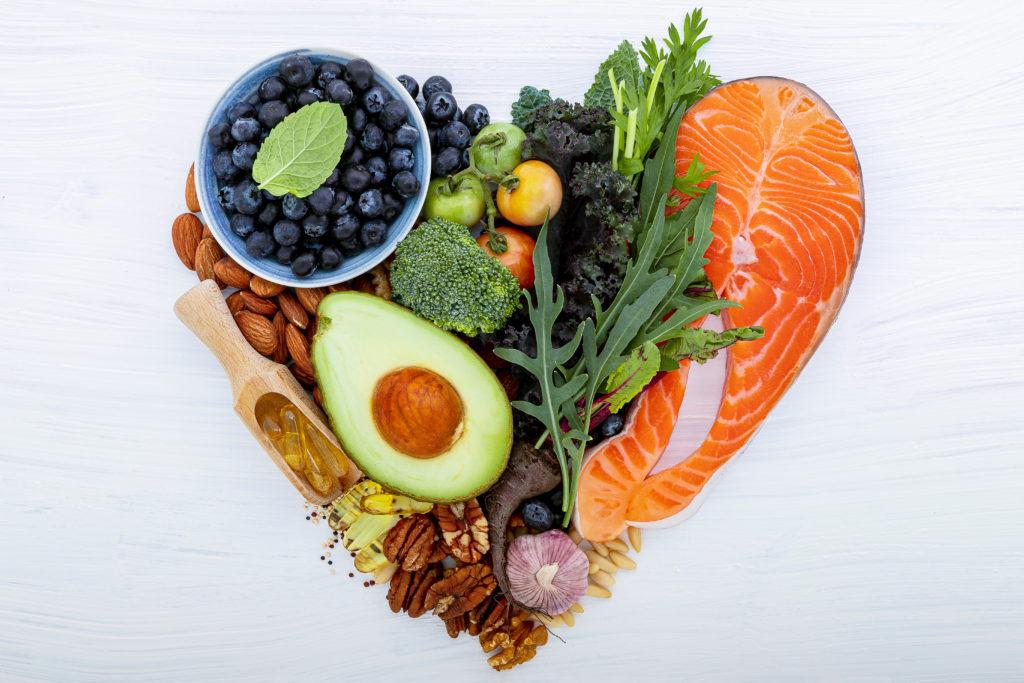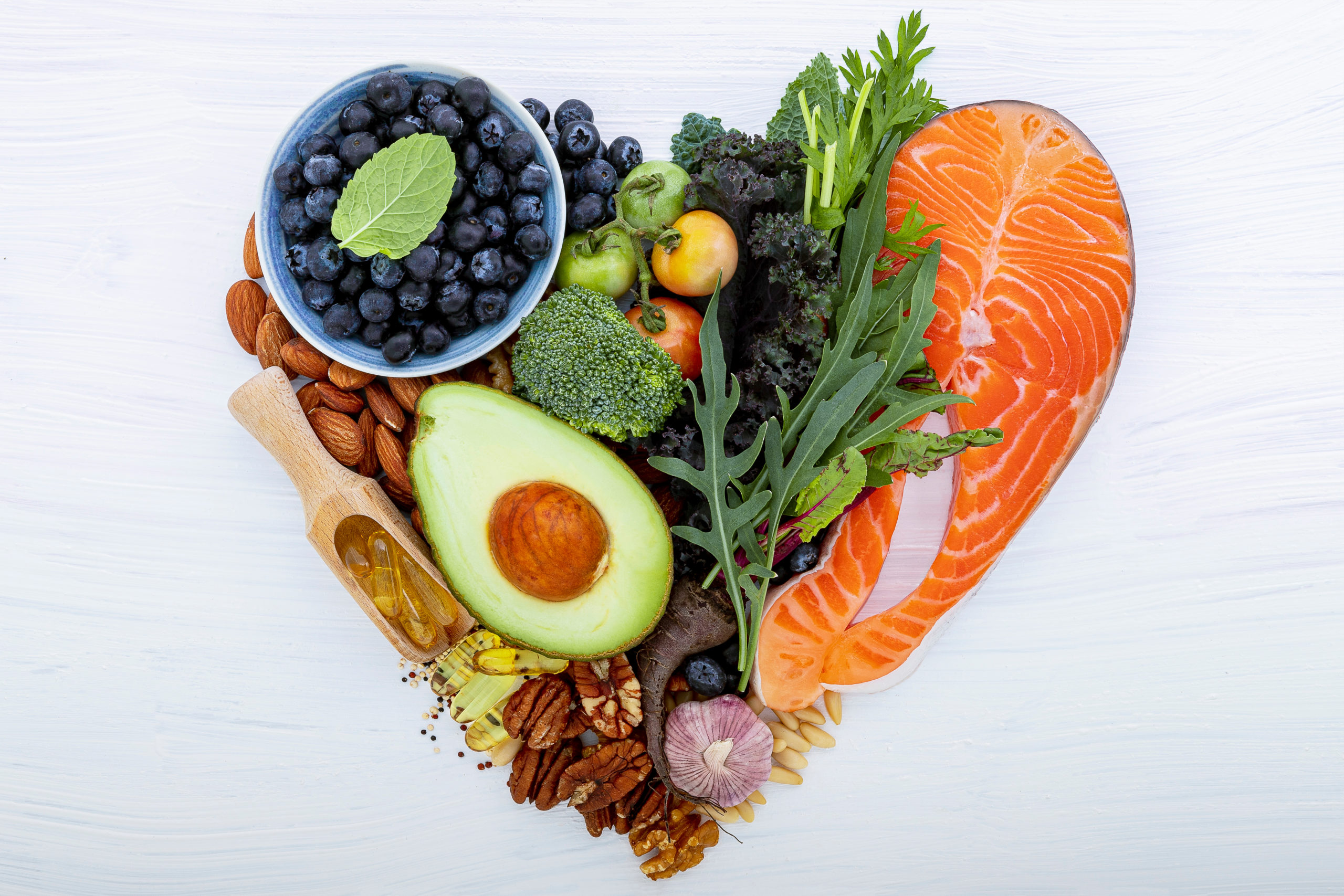Strokes can seem to come out of nowhere and have devastating effects on life. If you are at risk for having a stroke, have had one, or are caring for someone who has, you’re probably wondering how to help offer protection against a first or subsequent stroke.
Nutrition is key to stroke prevention and recovery. Starting with the foods you eat, you can make sure you’re getting enough of the best nutrients for stroke prevention.
Table of Contents
- Nutrients to Prevent Stroke
- Water
- Omega-3
- Fiber
- Vitamin D
- Magnesium
- Potassium
- B Vitamins
- A Word of Caution
- References
Nutrients to Prevent Stroke
Can a bad diet cause a stroke? It can certainly increase your risk of having one. What you eat plays a substantial role in your risk for various chronic diseases, including stroke. While many people are focused on getting a balance of protein, fat, and carbohydrates, it’s also helpful to look at other nutrients in the foods you eat.
Achieving sound nutrition requires a varied diet with plenty of foods. Some of the best nutrients to help prevent stroke are discussed below.
Water
Adequate water intake helps the heart pump blood more easily. Given that the heart pumps about 2,000 gallons of blood a day, water is vital for optimal heart health. Research shows that most of the elderly who presented with stroke in hospitals were dehydrated (measured by plasma osmolarity), and those who were dehydrated had a worse outcome. This may be because when you are dehydrated, your blood thickens, reducing your blood volume and causing the heart to overwork.
Thickened blood increases the risk of blood clots, which increases your risk of stroke. High blood pressure is also more prevalent in those who are chronically dehydrated. When your body’s cells are deprived of water, the brain signals the pituitary gland to constrict the blood vessels.
High blood pressure is a very prominent stroke risk factor. Staying hydrated is crucial for optimal heart health and primary and secondary stroke prevention. Some people may require a fluid restriction, and the specific amount will vary per person.
Omega-3 fatty acids
Omega-3 fats, including EPA and DHA, have potent anti-inflammatory effects. They can also reduce platelet aggregation and help reduce plaque buildup in the setting of atherosclerosis.
One systematic literature review found that higher circulating levels of DHA were inversely associated with incident atherothrombotic stroke risk. Some research even suggests that omega-3s may offer some neuroprotective benefits among people following a stroke.
Fiber
Fiber, a nutrient only found in plant foods, helps lower the risk of hemorrhagic stroke. In one systemic review and meta-analysis of eight cohort studies, consuming 7gm/day of fiber reduced the risk of stroke by 7%.
Another meta-analysis showed that for those who consumed 3-5 daily portions of dietary fiber, their risk of ischemic and hemorrhagic stroke was reduced by 26%.
Vitamin D
Research shows that Vitamin D levels are low in most people who experience a stroke, and vitamin D insufficiency is extremely common worldwide. Therefore vitamin D deficiency may be one of the risk factors for stroke.
More research is needed to explain why and confirm the exact link between the two. However, it is still important to ensure adequate consumption or supplementation before and after an acute stroke for prevention and optimal recovery.
Magnesium
In a meta-analysis of seven prospective studies including 241,378 participants, an additional 100 mg per day of magnesium from food was associated with an 8% decreased risk of total stroke, especially ischemic stroke. It has also been found to be especially important in secondary stroke prevention.
This may be because of the integral role magnesium plays in positively influencing the electrical signals of the heart. This allows the heart to fill up with blood before it contracts properly — which helps optimize proper blood flow to the rest of the body. Magnesium also influences the movements of potassium, sodium, and calcium across cell membranes.
Potassium
In one meta-analysis, a statistical analysis that combines the results of multiple scientific studies assessed potassium levels in 11 different studies. It was found that consuming 1600 mg more potassium per day was associated with a 21% lower risk of stroke.
In another study, research showed that post-menopausal women who ate the most potassium had a 27% lower risk of ischemic stroke (the most common type of stroke). As well as a 21% reduced risk for all stroke types compared with women who ate the least potassium.
Potassium reduces stroke by lessening the effects of salt, positively influencing blood pressure, and adding heart-healthy nutrients found in potassium-rich foods. For instance, many foods that are high in potassium also contain fiber.
Folate, Vitamin B6, and Vitamin B12
Vitamin B6, folate, and vitamin B12 are needed to avoid high homocysteine levels. Research has shown that high levels of homocysteine, a common amino acid in the blood, can be a risk factor for the early development of heart disease and stroke.
High homocysteine levels accelerate atherosclerosis formation. It also negatively impacts the endothelium (the tissue that lines blood vessels, heart, and lymphatic vessels) and smooth muscle cells. This means that elevated homocysteine can negatively change the arteries’ structure and function.
A Word of Caution
Nutrition is absolutely a key to improving your heart health and helping to prevent, and recover from, a stroke. It’s always best to get your nutrients through whole foods sources versus supplements, whenever possible. Why? Some supplements can interact with medications and even worsen heart health.
For example, some people at risk for stroke are put on blood-thinning medications, which can interact with certain supplements, causing the blood to be too thin. Potassium supplements can lead to cardiac death. Speak with a cardiology dietitian before adding new supplements to your health routine, especially if you’re on any medications or struggling to find all your nutrients through whole foods.
The amount of these nutrients you need will differ based on your current intake and blood levels, as well as other factors like medical history, sex, age, and weight. For personalized nutrition, learn more about my 1:1 individualized services here.

References
- Rowat A, Graham C, Dennis M. “Dehydration in Hospital-Admitted Stroke Patients: Detection, Frequency and Association.” Stroke. 2012; 43; 857-859. Doi: 10.1161/STROKAHA.111.640821.
- Ueno Y, Miyamoto N, Yamashiro K, Tanaka R, Hattori N. Omega-3 Polyunsaturated Fatty Acids and Stroke Burden. Int J Mol Sci. 2019;20(22):5549. doi:10.3390/ijms20225549
- Saber H, Yakoob MY, Shi P, et al. Omega-3 Fatty Acids and Incident Ischemic Stroke and Its Atherothrombotic and Cardioembolic Subtypes in 3 US Cohorts. Stroke. 2017;48(10):2678-2685. doi:10.1161/STROKEAHA.117.018235
- Threapleton DE, Greenwood DC, Evans CE, et al. Dietary fiber intake and risk of first stroke: a systematic review and meta-analysis. Stroke. 2013;44(5):1360-1368. doi:10.1161/STROKEAHA.111.000151
- He FJ, Nowson CA, MacGregor GA. Fruit and vegetable consumption and stroke: meta-analysis of cohort studies. Lancet. 2006;367(9507):320-326.
- Larsson SC, Orsini N, Wolk A. Dietary magnesium intake and risk of stroke: a meta-analysis of prospective studies. Am J Clin Nutr. 2012;95(2):362-366. doi:10.3945/ajcn.111.022376
- D’Elia L, Barba G, Cappuccio F, Strazzullo P. “Potassium Intake, Stroke, and Cardiovascular Disease: A Meta-Analysis of Prospective Studies.” Jrnl Am Coll Card. 2011: 57; 10: 12010-1219. Doi 10.1016/j.jacc.2010.09.070
- DiNicolantonio, J. J., Liu, J., & O’Keefe, J. H. (2018). Magnesium for the prevention and treatment of cardiovascular disease. Open Heart, 5(2), e000775. https://doi.org/10.1136/openhrt-2018-000775
- Seth A, Mossavar-Rahmani Y, Kamensky V, et al. Potassium intake and risk of stroke in women with hypertension and nonhypertension in the Women’s Health Initiative. Stroke. 2014;45(10):2874-2880. doi:10.1161/STROKEAHA.114.006046
